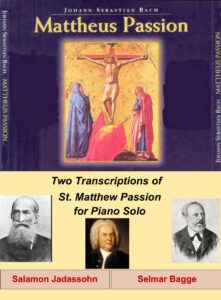AVE MARIA by Vladimir Vavilov (1925-1973) Wrongly attributed to G.Caccini, 1551-1618 (Piano and Voice sheet music).

Caccini’s best-known work is not by Caccini.
«… whoever deceives, will always find someone who lets himself be deceived. Everyone sees what you appear, few notices what you are, and these few will not dare to go against the majority…”
Niccolò Machiavelli
In musical creation, a piece of music composed by someone but intentionally attributed to another, or, at best, composed in the style of another composer for the performance or entertainment of the performer.
We have a very notorious example in the famous “Ave Maria” attributed to Giulio Caccini, an Italian composer of the 16th century, but it was not he who composed it, but a contemporary Russian musician: Vladimir Vavilov (1925-1973).
Giulio Caccini (1550-1618), currently a completely unknown author except for the work at hand, was an Italian composer, singer and instrumentalist of the 17th century. He went down in music history for his abilities as a harpsichord, lute, harp and zither player, but above all as a singer.
Browse in the Library:
He lived much of his life in Florence, in the service of the Medici family. As the most relevant fact of his stay at the Medici court, it should be noted that he was part of the famous Florentine Camerata, a group of humanists, musicians, poets and intellectuals of the late Renaissance united under the patronage of Count Giovanni de’ Bardi and to whom The invention of opera as a musical genre is due.
On the other hand, Vladimir Vavilov (1925-1973), was a Russian composer and lute player, a specialist in Renaissance music, who often systematically attributed his compositions to other composers.
The reason for this way of acting by Vavilop is unknown, but all of his compositions always appear attributed to generally older musicians, so it was easy to present them as exhumations of forgotten works resulting from musicological research.
The truth is that if this were the purpose, the work would be very poorly done, since the works sounded suspiciously like the tonalities of a romanticism much later than the time of the supposedly original ones.
Vladimir Vavilop’s daughter, Tamara, went so far as to justify the conduct on the grounds that a composition signed by an unknown author with a common last name would have no future. But the enigma lives on, as Tamara’s argument is not entirely convincing.
There is also a theory that in the Russia of Stalin’s terror, going unnoticed was the best life insurance for a composer. Vavilop’s attribution of his works to authors distant in time and somewhat unknown, would allow him to develop his compositional work without political problems.
In 1970 Vavilov released an LP entitled “Lute Music of the XVI-XVII Centuries”, but despite the name of the album, he composed almost all the recorded pieces himself. He attributed all the pieces to Baroque or Renaissance composers, even if they did not fit their style.
Interestingly on this LP, Vladimir Vavilov edited and recorded the “Ave Maria” as an anonymous piece, and no one knows why, after Vavilov’s death, Mark Shakhin (the organist who participated in the recording of the LP) attributed the work to Giulio Caccini. Despite everything, the deception continues to survive and there are many misunderstandings and versions (which are more grotesque and far from Caccini’s way of composing) that continue to be made.
Best Sheet Music download from our Library.
Ave Maria – Live From Basilica Di Santa Maria Sopra Minerva, Italy / 1999
Andrea Bocelli (tenor)
Orchestra dell’Accademia Nazionale di Santa Cecilia
Myung-whun Chung (director)
Please, subscribe to our Library. Thank you!
Vladimir Vavilov
Vladimir Fyodorovich Vavílov (Russian: Влади́мир Фёдорович Вави́лов; May 5, 1925–Ib., March 11, 1973, Saint Petersburg), known as Vladimir Vavilov, was a Soviet guitarist, lutenist and composer. He learned Guitar with P. Isakov and composition with Johánn Admoni at the Rimsky-Kórsakov University of Music in Leningrad. He had an important role in the revival of early music in the Soviet Union.
Vavílov was both a lute and guitar player, he held the position of editor at a state music publisher and, above all, he was a composer.
He habitually attributed his own works to other composers, usually of the Renaissance and Baroque but also of later times, usually without respecting the style of the corresponding period.
His works reached a large circulation and some of them became authentic pieces of folk music used to set different poems to music.
Despite being a great composer, Vavílov died of pancreatic cancer in conditions of great poverty. A few months later, ‘The City of Gold’ was published, which became an immediate success.
The most famous of his anonymous or falsely attributed compositions are:
The most famous of his anonymous or misattributed compositions are:
"Canzona by Francesco da Milano". Poets Anri Volokhonsky and Alexei Khvostenko would later set lyrics to this music, the song called "The City of Gold" song (in Russian "Город Золотой"). The song, in turn, would become a hit in the 1980s when it was performed by Aquarium for the soundtrack for the film Assa.[1]
"Mazurka by Andrey Sychra",
"Elegy by Mikhail Vyssotsky",
"Russian Melody (tremolo study) by Mikhail Vyssotsky",
"Ricercar by Niccolo Nigrino",
"Impromptu" by Miliy Balakirev.
"Ave Maria". Vavilov wrote this aria with the ascription "Anonymous", and it was later mis-attributed to Giulio Caccini. It is often performed, notably by Inessa Galante, Andrea Bocelli, Sumi Jo and Charlotte Church, inter alia